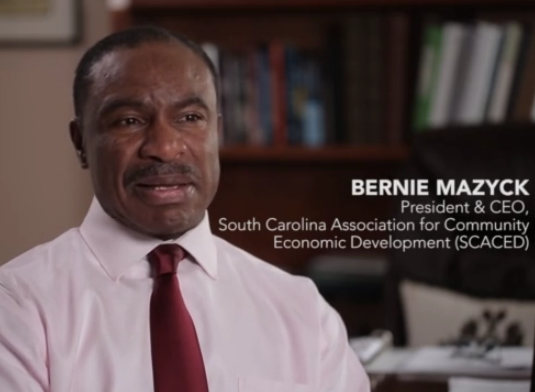Building healthy communities in South Carolina

Burnett "Bernie" Mazyck of the S.C. Association for Community and Economic Development calls on people to visit and learn from South Carolina in the wake of the Charleston church massacre. "Take note of the way that we have responded to this disaster and follow this approach to violence, which is to reconcile across lines of race and class and to participate in what seems to be a new movement of nonviolence and reconciliation," he says. (Image is a still from the video below.)
The Mary Reynolds Babcock Foundation funds organizations in the South working to move people and places out of poverty. The foundation recently launched a "Southern Voices" oral history project to capture the stories of Southern leaders working for social and economic justice. The latest installment features stories about community and economic development in South Carolina. For more stories from the project, click here. (Disclosure: The Mary Reynolds Babcock Foundation is a funder of the Institute for Southern Studies.)
* * *
After days of contentious and emotional arguments, South Carolina's political leaders decided to remove the Confederate flag from the capitol grounds. One lawmaker opened the debate in the House by reading aloud the names of nine parishioners murdered inside Charleston's Emanuel AME Church. The man charged with killing them apparently posted a manifesto featuring photographs of himself brandishing the rebel flag and other symbols associated with white supremacist movements. Witnesses say he shouted racial slurs as he shot the churchgoers. He was consumed by hatred.
In stark contrast stands the life of Clementa Pinckney. As a minister and state senator, he championed many causes on behalf of his parishioners and constituents. "His life was so clear. He was selfless. He was giving of himself. He's been a true servant, sacrificing so much of his personal life for the betterment of other people," said Burnett Mazyck, president and CEO of the South Carolina Association for Community Economic Development (SCACED).
Their friendship was rooted, in part, in their shared focus on opportunity. "His district covers a number of counties that are among the poorest in the state," Mazyck said. "He was very interested in state programs and resources that would support economic initiatives and prosperity where traditional programs don't work. Microenterprise development was very important, as well as healthy food access, which would help us use land assets and traditional farming in rural areas to promote the production of healthy foods to assist with health disparities and develop a network for business and job creation. Those are tangible examples of Sen. Pinckney's passions."
SCACED is a statewide network of nonprofits, financial institutions, local governments and businesses focused on underserved areas, from urban centers to the rural countryside. The video above shows how the association works through its members to strengthen communities. Coastal Community Foundation (CCF) Interim President and CEO Richard Hendry says this collaborative approach benefits everyone involved. "In the decades that I've worked in the nonprofit sector through CCF, I've seen a steady and strong movement toward communication and cooperation among nonprofit organizations in our service area."
Hendry points to Beaufort County's Human Services Alliance and the Bunnelle Foundation's Common Issues/Common Threads in Georgetown County as networks that have strengthened all of their constituent organizations. Examples of those include the South Carolina Community Loan Fund, which offers financing and technical assistance for affordable housing and business development. Through education and legal services, the Center for Heirs' Property Preservation helps families retain their land, gain sustainable economic benefits from it and create generational wealth. The Sustainability Institute helps residents and businesses conserve energy and reduce their environmental impacts. "They're making gigantic changes in our built and natural environment, in our economies, and in equity for broad swaths of our populations," Hendry said.
In response to the violence at Mother Emanuel, CCF has established the Lowcountry Unity Fund. Hendry says donations will support long-term solutions to racism and economic inequality, and finance programs that "foster a climate of love, equality and progress for many years to come."
Mazyck issues an invitation for Americans who feel moved to act. "Come and visit Charleston and visit South Carolina. Take note of the way that we have responded to this disaster and follow this approach to violence, which is to reconcile across lines of race and class and to participate in what seems to be a new movement of nonviolence and reconciliation. Pay attention to the work that we're doing around community economic development. Partner with organizations across the state that are working to bring about economic parity."
He says the support pouring in is a great comfort to Rev. Pinckney's loved ones and his beloved, wounded city. "We've been able to bear it because so many throughout the country have responded with such love, concern and compassion. That's what is helping his family, the families of the other eight and the entire Charleston community and beyond. That's what's helping us to heal and recover."
